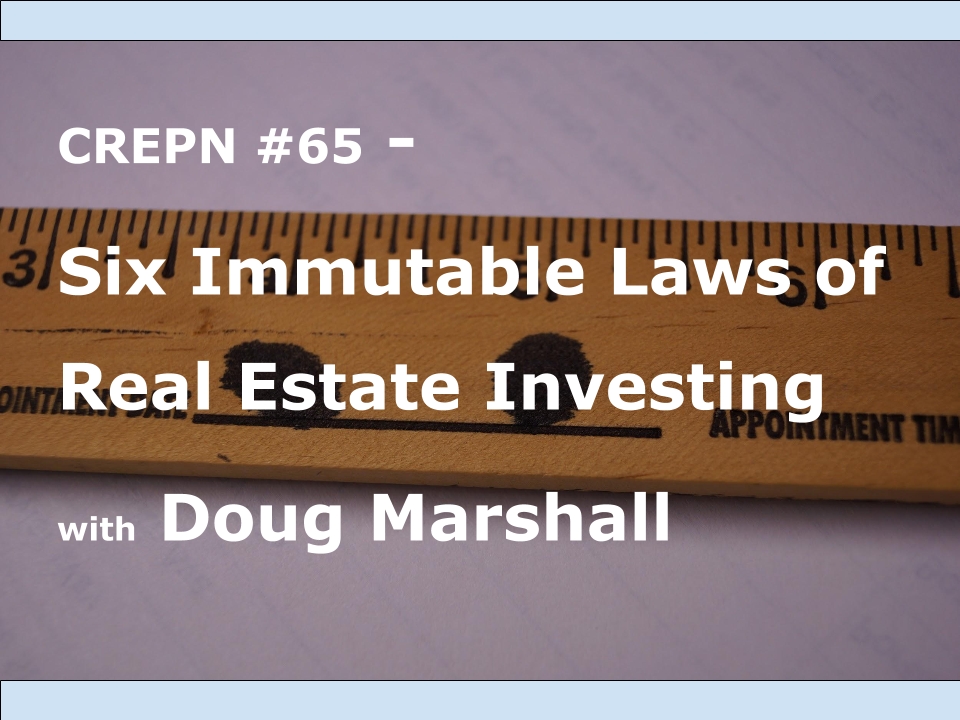
04 Nov CREPN #65 – What are the Six Immutable Laws of Real Estate Investing? with Doug Marshall
The Six Immutable Laws of Real Estate Investing Guest Doug Marshall provides his Six Immutable Laws of Real Estate Investing. James Montier is best known as the author of The Little Book of Behavioral Investing. Recently he wrote an article titled “The Seven Immutable Laws of Investing.” In this article he identifies seven principles for sensible investing in the stock or bond markets. [x_audio_embed][/x_audio_embed] I was intrigued by the title so I read the article and somewhere along the way I realized that six of these seven “immutable laws of investing” also apply to investing in commercial real estate. So I thought what the heck, maybe I should take a stab at writing an article with the title of “The Six Immutable Laws of Real Estate Investing” fashioned after Mr. Montier’s article. Immutable means: it means unchangeable, or unwavering. So these laws are like the laws of physics, or the law of gravity. They never change. The first immutable law of real estate investing is:
- Always insist on a margin of safety. In other words the goal is not to buy at fair market value but to purchase with a margin of safety. In our world of commercial real estate this means finding properties that are under performing the market. It may be that property is currently being poorly managed or a property that needs to be renovated to justify higher rents. So the asking price placed on that property by the seller is a bargain in the eyes of the buyer because he has a plan to increase its value. Easy to say, but in today’s market, it’s hard to do.
- This time is never different. The four most dangerous words in investing – “this time is different.” The dot.com bubble that occurred about fifteen years ago is a perfect example. Investors were buying stock in companies that hadn’t turned a profit on the expectation that they would be the next Google, or Amazon.com. Stock prices soared and even though it made no logical sense the argument that was bandied about was, “this time is different.” The same was true of real estate before the Great Recession. How many believed that house prices could never go down? In both examples a speculative fever resulted in a bubble causing stocks and house prices to plummet in value. Whenever someone starts saying this time it’s different, get out of that investment as quickly as you can.
- Be Patient and Wait for the Fat Pitch. As Mr. Montier states in his article, “Patience is integral to any value-based approach… However patience is in rare supply.” In commercial real estate there is a time to wait and there is a time to act. When things go bad, like what occurred after the Great Recession the tendency is to dump our real estate holdings as quickly as we can when the prudent thing to do is wait. Most investors suffer from an “action bias” – a desire to do something. But often times the best thing to do is to stand at the plate and wait for the fat pitch.
- Be Contrarian. Humans are prone to the herd instinct. When everyone is buying they buy; when everyone is selling they sell. In 2009 during the worst of the recession a group of us put under contract an apartment that had been foreclosed on by the lender. It took me nine months to find a lender who would finance this property. Today, the property is by far my best investment. The value of this property has increased three fold and is generating hefty ownership distributions. Was it scary buying that property in 2009? You bet it was. We were buying when everyone else was selling. But we fought the urge to follow the herd and it paid off handsomely.
- Be Leery of Leverage. I really shouldn’t have to say much of anything on this topic. In many instances those owners with properties that were over leveraged prior to the Great Recession paid the ultimate price – the loss of their properties. Those homeowners who used their homes as ATM machines learned the hard way too as many lost their homes.
- Take advantage of all the blue light specials lenders are offering today – record low interest rates, interest only loans, non-recourse financing, etc. but do not over leverage your properties. When the real estate market turns again, and it will, you want to have the peace of mind of knowing that the property is not over leveraged. And as you know a property that is underwater has the potential risk of losing it to the lender if they were to call the loan.
- Never Invest In Something You Don’t Understand. This is just plain old common sense. But I’ve learned over the years that common sense is not common. You should never invest in a property type or location you don’t fully understand. This can happen two ways with real estate:
- I talk with investors that are new to investing in real estate. They’ve been told how good of an investment real estate has been so they are excited to invest their life savings in the purchase of a property. Yes real estate can be an excellent investment but buying a property puts them at the mercy of their real estate advisors. Many times these advisors have a different agenda than the owner, but the owner, not knowing the fundamentals of commercial real estate, is unaware of the conflict of interest. So be careful with your selection of real estate advisors. And ask a lot of questions;
- Sometimes a real estate investor understands a particular property type or location really well. For example, they have good real estate experience owning apartments on the Westside of Portland. But that doesn’t mean they understand other property types like multi-tenanted retail located in SE Portland. It doesn’t mean they shouldn’t purchase this property type or location. But it does mean they need to be careful and maybe lean on other real estate advisors that have the necessary experience to evaluate a particular real estate opportunity.

